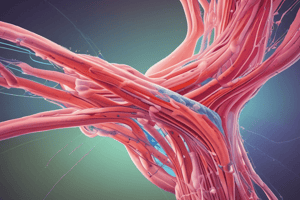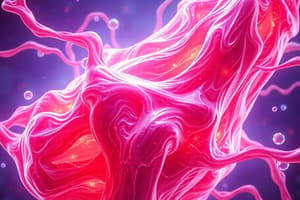Podcast
Questions and Answers
Which of the following are properties of muscle tissue? (Select all that apply)
Which of the following are properties of muscle tissue? (Select all that apply)
- Excitability (correct)
- Contraction
- Elasticity (correct)
- Extensibility (correct)
Skeletal muscle is considered involuntary muscle.
Skeletal muscle is considered involuntary muscle.
False (B)
What are the specialized cells in muscle tissue called?
What are the specialized cells in muscle tissue called?
myocytes or muscle fibers
What are the two main protein filaments found in muscle cells that facilitate contraction?
What are the two main protein filaments found in muscle cells that facilitate contraction?
What type of muscle is characterized by branched cells with one or two nuclei?
What type of muscle is characterized by branched cells with one or two nuclei?
Smooth muscle is under voluntary control.
Smooth muscle is under voluntary control.
The muscle type that is most commonly found in the walls of tubular structures is called ______.
The muscle type that is most commonly found in the walls of tubular structures is called ______.
What is the biological classification of skeletal muscle cells due to their formation?
What is the biological classification of skeletal muscle cells due to their formation?
Study Notes
Muscle Tissue Properties
- Muscle tissue is excitable, meaning it can respond to stimuli.
- Muscle tissue can contract (shorten) and extend (lengthen).
- Muscle tissue can be stretched without tearing.
- Muscle tissue can return to its original shape after stretching.
Muscle Tissue Structure
- Muscle tissue contains specialized cells called myocytes or muscle fibers.
- Myocytes are characterized by the proteins actin and myosin which create contractions.
- Muscle tissue is classified as striated or non-striated (smooth) based on the arrangement of actin and myosin filaments within the myocytes.
Skeletal Muscle
- Skeletal muscle is the most common type of muscle tissue found in the body.
- Skeletal muscle is made up of multinucleated, non-branching cells arranged in parallel.
- Skeletal muscle cells are formed by the fusion of smaller cells called myoblasts.
- Skeletal muscle is often referred to as "voluntary" muscle because it is under conscious control.
Cardiac Muscle
- Cardiac muscle is striated, containing similar contractile proteins arranged in sarcomeres as skeletal muscle, but shorter and broader than skeletal muscle cells.
- Cardiac muscle cells (cardiomyocytes) are branched at their ends and usually have one nucleus but sometimes two.
- Cardiac muscle striations are less defined due to the presence of many mitochondria and organelles.
- Cardiac muscle cells are surrounded by loose connective tissue similar to endomysium in skeletal muscle.
Smooth Muscle
- Smooth muscle is found in the walls of tubular structures and hollow organs.
- Smooth muscle cells are uninucleated, smaller and shorter than skeletal muscle cells.
- Smooth muscle cells are spindle-shaped with long tapered ends and are subject to subconscious/involuntary control.
- Smooth muscle arrangement varies from organ to organ.
Studying That Suits You
Use AI to generate personalized quizzes and flashcards to suit your learning preferences.
Related Documents
Description
Explore the fascinating characteristics and composition of muscle tissue in this quiz. Learn about the properties of muscle tissue, the structure of myocytes, and the specifics of skeletal muscle. Ideal for students studying biology, this quiz will test your understanding of how muscles function.




